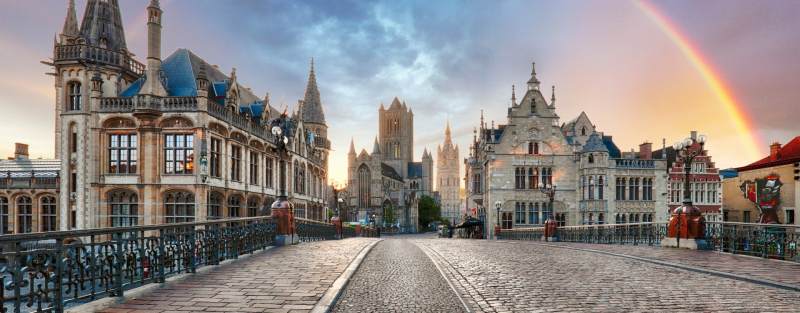Live and Work in Belgium
Information & guidance about seasonal jobs in Belgium
Belgium is a vibrant, diverse country at the heart of Europe, known for its rich culture, history, and open-minded people.
With thriving urban centers, picturesque villages, and beautiful landscapes, Belgium provides an ideal blend of work opportunities and lifestyle benefits for those looking to relocate. This guide will cover everything you need to know about living and working in Belgium, from finding a job and accommodation to navigating everyday life and exploring the country’s unique offerings.
Seasonal jobs in Belgium
We don’t have any jobs matching this search. Below you’ll find a selection of our most popular vacancies!
- Hotel jobs, Nanny jobs, Tourism
- Greece
- Hotel jobs, Tourism
- Cyprus, Greece, Spain
- Adventure jobs, Hotel jobs, Tourism
- Bulgaria, Croatia, Egypt, Greece, Italy, Spain, Turkey
Working in Belgium
Belgium’s job market is diverse and well-developed, attracting talent from across Europe due to its high standard of living, favorable work-life balance, and job stability. Here’s what you need to know about working in Belgium, from job opportunities to salaries, work culture, and essential administrative steps.
Job Opportunities in Belgium
Belgium has a strong economy with well-established sectors such as finance, technology, logistics, healthcare, and government services. Additionally, Brussels serves as the capital of the European Union, offering a wide range of positions in EU institutions, international organizations, and NGOs.
- Key Industries: Information Technology, Healthcare, Engineering, Finance, Public Administration, and Pharmaceuticals.
- Growing Sectors: Green technology, digital transformation, cybersecurity, and research and development.
If you’re an EU citizen, you won’t need a visa to work in Belgium, but securing a work contract beforehand can ease the transition. For non-EU nationals, Belgium requires a work permit and, in some cases, a long-term visa. Highly skilled professionals may qualify for special permits, like the Blue Card, which offers added flexibility for employment across EU countries.
Salaries and Taxes
Belgium offers competitive salaries, though wages vary by industry and region. Here’s a quick overview of typical salaries and taxes in Belgium:
Average Salary: The average monthly gross salary in Belgium is approximately €3,600. However, salaries vary by profession. For example:
- IT Specialist: €4,500 per month
- Healthcare Professional: €4,200 per month
- Engineer: €4,000 per month
- Customer Service: €2,200 per month
13th Month Bonus: Many companies in Belgium offer a “13th month” salary bonus in December, which serves as a significant financial boost for employees at the end of the year.
Taxes: Belgium has a progressive income tax system, with rates ranging from 25% to 50%, depending on income level. Social security contributions are also required and are deducted from gross income, covering healthcare, pension, and unemployment benefits. Despite high tax rates, these funds contribute to Belgium’s extensive social services, ensuring a high quality of life.
Work Culture in Belgium
Belgium has a formal and structured work culture, though it varies slightly by region (Flemish, Walloon, and Brussels). Respect for hierarchy, punctuality, and clear communication are highly valued in the workplace.
- Work Hours: The standard work week in Belgium is 38 hours, typically from 8:30 am to 5:30 pm, though flexible working arrangements are becoming more common, especially in tech and creative sectors.
- Vacation: Employees are entitled to a minimum of 20 days of paid vacation annually, with additional public holidays adding more days off throughout the year.
Finding a Job
To find job opportunities in Belgium, explore these resources:
- Job Websites: vacature.com, stepstone.be, and indeed.be
- Networking Events: Many cities, especially Brussels, have networking events tailored for international job seekers.
- Recruitment Agencies: Specialized agencies such as Randstad, Hays, and Accent Jobs can help you find suitable roles in various sectors.

Living in Belgium
Living in Belgium offers a blend of modern amenities and rich cultural experiences, from its beautiful cities and small towns to an efficient public transportation system and diverse population. Below is an overview of what to expect when you relocate to Belgium.
Accommodation in Belgium
Finding the right place to live in Belgium is essential to settle in comfortably. Here’s what you should know about housing:
Renting vs. Buying: Most newcomers start by renting, as buying property can be more complex. Renting also provides flexibility while you get acquainted with the area.
Average Rent: In major cities, like Brussels and Antwerp, expect to pay between €800-€1,300 per month for a one-bedroom apartment. In smaller towns, rent is more affordable, often ranging from €500-€800 per month.
Popular Rental Websites:
- pap.be
- immo.vlan.be
- zimmo.be
- immoweb.be
Once you sign a lease, remember to register it within four months at your local Treasury Office to avoid penalties.
Cost of Living
Belgium’s cost of living is moderate compared to other Western European countries, but it varies by region. Here are some average monthly expenses to consider:
- Groceries: €250-€350 per month for a single person
- Utilities: €100-€150 per month for electricity, water, and heating
- Public Transportation: Around €50-€70 per month with a monthly pass, depending on the city
- Dining Out: A meal at a mid-range restaurant costs around €15-€25
Healthcare System
Belgium has a high-quality healthcare system with a mix of public and private providers. All residents must have health insurance, which is often arranged by employers or can be acquired independently.
- Health Insurance Cost: Basic health insurance is around €100 per month.
- Quality of Care: Belgium is known for its top-notch healthcare facilities and highly skilled medical professionals. Residents are also free to choose their healthcare providers.
Education and Language
Belgium has an excellent education system, with options for public, private, and international schools. The country is also multilingual, with Dutch, French, and German as the three official languages, though English is widely spoken, particularly in Brussels and tourist areas.
- Public Education: Education is free for residents until the age of 18, though families may pay for school supplies and trips.
- Language Learning: Knowing the local language can help you integrate faster. Many Belgian employers offer language classes, or you can enroll in local programs.
Culture and Leisure
Belgium is culturally rich, with a vibrant history reflected in its architecture, festivals, and art. Here are some cultural highlights to enjoy:
- Museums and Galleries: Brussels, Bruges, and Antwerp have world-renowned museums and art galleries showcasing Belgian art, history, and international exhibitions.
- Cuisine: Belgium is famous for its chocolate, beer, waffles, and fries. Food lovers can also explore Belgium’s diverse culinary scene, from fine dining restaurants to bustling food markets.
- Sports and Outdoor Activities: Belgians love cycling, and you’ll find excellent routes and bike rentals throughout the country. Hiking and water sports are also popular, especially in the scenic Ardennes region.
Popular Destinations
If you live in Belgium, you’re never far from some of Europe’s most beautiful sites:
- Brussels: Visit the stunning Grand Place, European Union headquarters, and try the best chocolate shops.
- Bruges: Known as the “Venice of the North,” Bruges is famous for its medieval architecture and art museums.
- Ardennes: Nature lovers will enjoy hiking, mountain biking, and exploring charming villages in this lush, forested area.
Practical Tips
If you’re planning to move to Belgium, here are a few important steps to take:
- Register with the Municipality: Upon arrival, register at your local commune or municipality. This registration is essential for residency status and accessing local services.
- Banking and Financial Services: Belgium has many international and local banks where you can open an account. Online banks like N26 and Revolut are also popular among expats.
Moving to Belgium offers a unique opportunity to work in a stable economy and live in a culturally rich and diverse environment. With proper planning and an understanding of Belgian work and lifestyle practices, you can enjoy a successful and fulfilling experience in this welcoming European country.
Whether you’re looking to advance your career or simply want to explore a new part of Europe, Belgium has something to offer for everyone.








